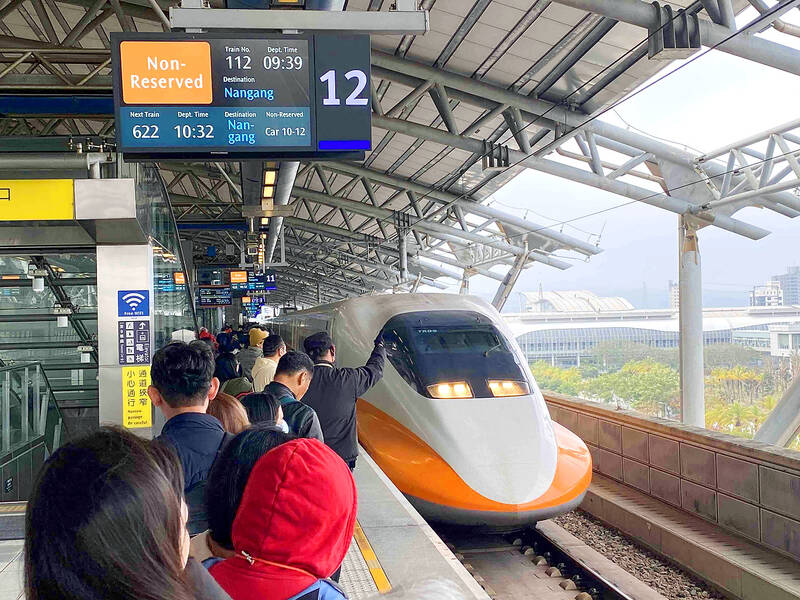Planned high-speed rail (HSR) extensions would blanket Taiwan proper in four 90-minute commute blocs to facilitate regional economic and livelihood integration, Railway Bureau Deputy Director-General Yang Cheng-chun (楊正君) said in an interview published yesterday.
A project to extend the high-speed rail from Zuoying Station in Kaohsiung to Pingtung County’s Lioukuaicuo Township (六塊厝) is the first part of the bureau’s greater plan to expand rail coverage, he told the Liberty Times (sister paper of the Taipei Times).
The bureau’s long-term plan is to build a loop to circle Taiwan proper that would consist of four sections running from Taipei to Hualien, Hualien to Taitung and Taitung to Kaohsiung in addition to the section from Kaohsiung to Taipei, with each segment taking 90 minutes to travel, he said.

Photo: Huang Hsu-lei, Taipei Times
The travel time is the standard for linking locations with high-speed rail, as it enables people to complete a round trip in three hours, allowing same-day commutes, he said.
Taiwan’s eastern seaboard relies on inherently slow conventional rail lines that make use of circuitous routes, which renders the system susceptible to outages from natural disasters and further decreases speed, Yang said.
Building high-speed railways around Taiwan would be a significant boost to economic development on the east coast, he said.
However, the Kaohsiung-Pingtung plan has sparked uneasiness among Kaohsiung residents, as the project could potentially disrupt traffic in the city’s busy downtown area, he said.
The bureau is conducting extensive studies to explore engineering solutions and is confident that the project can utilize tunnel shielding to avoid impeding traffic on the city’s busy Jhonghua and Minzu roads, he said.
Officials expect to break ground on the Kaohsiung-Pingtung project in the first half of 2028 and complete it within about 11 years, Yang said.
The project would be largely unaffected by the legislature’s budget cuts, as its funding draws entirely from the Forward-looking Infrastructure Development Program, although the loss of travel funds would inconvenience the bureau’s efforts to arrange in-person meetings with local officials, he said.
Separately, Deputy Minister of Transportation and Communications Chen Yen-po (陳彥伯) on Thursday said that the ministry aims to achieve a 20 percent reduction in carbon emissions by 2030 and a 33.4 percent reduction by 2035 against 2005 levels.
This would entail efforts to increase public transportation capacity, create a friendly environment for pedestrians and bicycles, and support electric vehicles and energy efficient vehicle technologies as well as sustainable aviation fuel, he told a meeting of the National Climate Change Committee in Taipei.
Highlights of the ministry’s programs include integrating rail, metro and YouBike to enable end-to-end public transportation, and the total substitution of privately owned gas-powered vehicles for electric ones by 2040, he said.
In addition, sustainable aviation fuels are being introduced to the airports in Taoyuan, Taipei and Kaohsiung, with the goal of replacing 5 percent of the fuel used by airplanes, he said.
In 2022, Taiwanese vehicles released 36.28 million tonnes of carbon, or 12.69 percent of the nation’s total emissions, he said, adding that the figure also marked an increase of 840,000 tonnes compared with the previous year.
Transportation is the nation’s fourth-largest contributor to greenhouse gases behind manufacturing, energy, and residential and commercial emissions, he said.
Passenger vehicles and light trucks accounted for 48.99 percent and 17.77 percent of all transportation-related emissions respectively, while 96.32 percent of all transport emissions originated from vehicles on roadways, he said.

The manufacture of the remaining 28 M1A2T Abrams tanks Taiwan purchased from the US has recently been completed, and they are expected to be delivered within the next one to two months, a source said yesterday. The Ministry of National Defense is arranging cargo ships to transport the tanks to Taiwan as soon as possible, said the source, who is familiar with the matter. The estimated arrival time ranges from late this month to early next month, the source said. The 28 Abrams tanks make up the third and final batch of a total of 108 tanks, valued at about NT$40.5 billion

Two Taiwanese prosecutors were questioned by Chinese security personnel at their hotel during a trip to China’s Henan Province this month, the Mainland Affairs Council (MAC) said yesterday. The officers had personal information on the prosecutors, including “when they were assigned to their posts, their work locations and job titles,” MAC Deputy Minister and spokesman Liang Wen-chieh (梁文傑) said. On top of asking about their agencies and positions, the officers also questioned the prosecutors about the Cross-Strait Joint Crime-Fighting and Judicial Mutual Assistance Agreement, a pact that serves as the framework for Taiwan-China cooperation on combating crime and providing judicial assistance, Liang

A group from the Taiwanese Designers in Australia association yesterday represented Taiwan at the Midsumma Pride March in Melbourne. The march, held in the St. Kilda suburb, is the city’s largest LGBTQIA+ parade and the flagship event of the annual Midsumma Festival. It attracted more than 45,000 spectators who supported the 400 groups and 10,000 marchers that participated this year, the association said. Taiwanese Designers said they organized a team to march for Taiwan this year, joining politicians, government agencies, professionals and community organizations in showing support for LGBTQIA+ people and diverse communities. As the first country in Asia to legalize same-sex

MOTIVES QUESTIONED The PLA considers Xi’s policies toward Taiwan to be driven by personal considerations rather than military assessment, the Epoch Times reports Chinese President Xi Jinping’s (習近平) latest purge of the Chinese People’s Liberation Army (PLA) leadership might have been prompted by the military’s opposition to plans of invading Taiwan, the Epoch Times said. The Chinese military opposes waging war against Taiwan by a large consensus, putting it at odds with Xi’s vision, the Falun Gong-affiliated daily said in a report on Thursday, citing anonymous sources with insight into the PLA’s inner workings. The opposition is not the opinion of a few generals, but a widely shared view among the PLA cadre, the Epoch Times cited them as saying. “Chinese forces know full well that